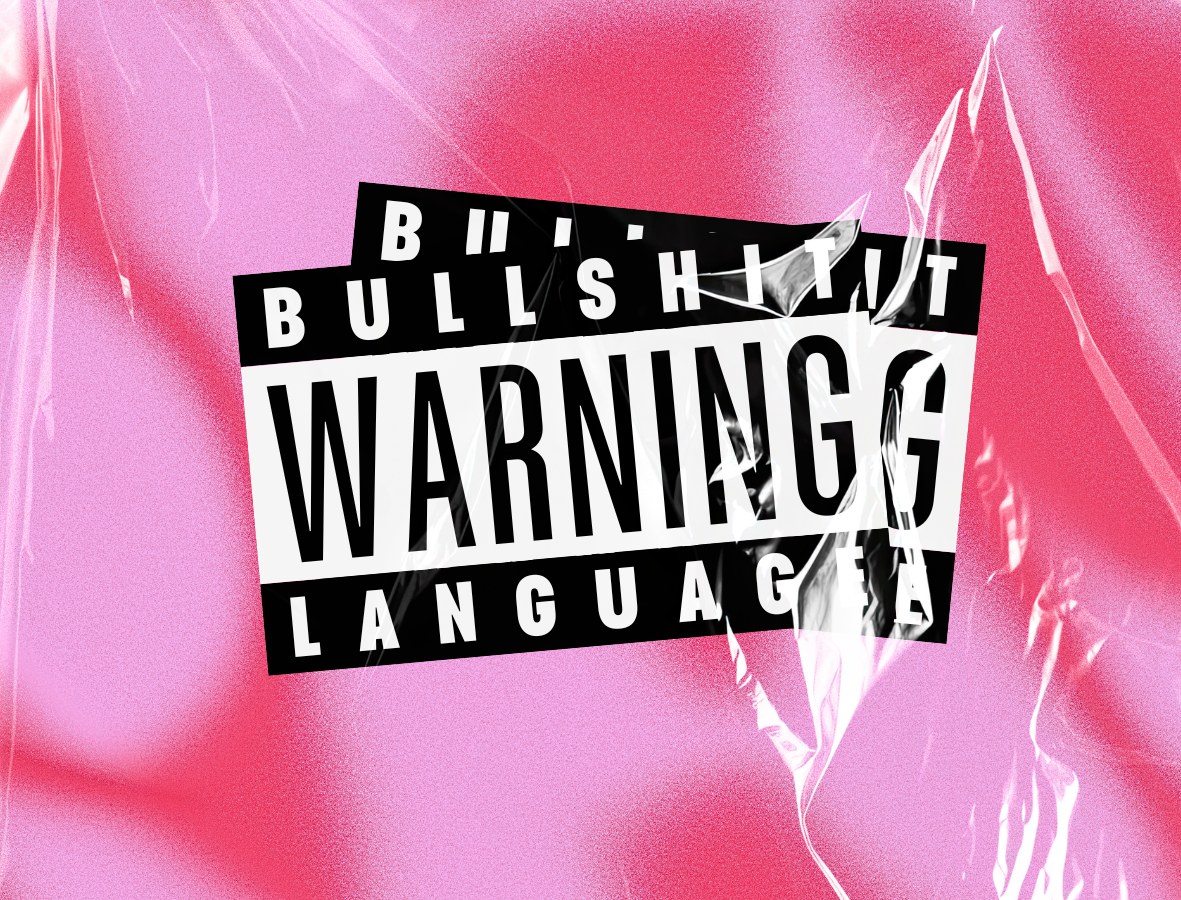Language Warning
From ‘frivolous spenders’ to ‘risk averse savers’ - how the patriarchy has it both ways when it comes to stereotypes about women and money, and how we need to watch our language if we’re going to achieve financial freedom and dismantle the boys club.
We live in a gendered world. If you’re reading this, that’s probably not news to you. But have you ever stopped to think about how that gendered world translates into everyday stereotypes that are actually costing women from achieving financial freedom, independence and liberation? We have, and it keeps us up at night. The language that we, as a society, use to talk about women and money sucks. Well, we’re sick of the patriarchy having it both ways when it comes to women and money, and it’s high time to channel the confidence of many a mediocre white man and take the power back. That starts with watching our language, ladies*.
Cris Parker is the Head of The Ethics Alliance at the Ethics Centre and Director of The Banking & Finance Oath and our special guest for Part Two of Ladies Talk Money (watch the videos here!). As a trailblazer of bringing ethics into the professional conversation, Cris feels passionately about getting women comfortable having conversations about money, and doing so as fast as we can. After all, we’ve got some catching up to do! While Cris has some great (and not so great) stories to share when it comes to her financial journey, she captures it perfectly when she says:
“There are some early claims that Generation Z women are smarter with money than their mothers and grandmothers have been. Good. They will need to be.”
It’s clear that being on top of our money is essential to our survival and liberation as women, of all ages and colours and abilities and socioeconomic backgrounds. As poet, feminist and civil rights activist Audre Lorde says, “I am not free while any woman is unfree, even when her shackles are very different from my own.” However, too often, we are left out of the conversation entirely, whether as a result of deliberate exclusion (think: ‘boys club’, ugh), or whether it’s because we opt out because we don’t feel comfortable, represented or meaningfully included - one thing is for sure: it’s costing us literal dollars and makes no cents sense.
Feeling uncomfortable? You’re not alone
A study by Fidelity Investments found that 8 in 10 women feel uncomfortable talking about money. Chances are, you’re one of them. What’s scary is that’s 8 in 10 women who have internalised the message that money is ‘not for us’. And as a result, gendered stereotypes and systemic exclusion have continued to reign supreme to the benefit of everyone except us.
Interestingly, while the majority of women feel uneasy broaching money conversations, 83% of women are craving to know more and improve their financial literacy. Knowing that 80% of women simultaneously don’t feel comfortable talking about money but really, really want to is one of the main reasons we started Ladies Talk Money.
Everyone deserves access to the knowledge and information they need to have meaningful conversations about and take control of their money. Accepting the flawed notions that women are inherently ‘bad with money’ or that ‘finance isn’t for us’ or that there’s nothing we can do to change things shouldn’t be our only options. And certainly not on our watch. So, if we want to truly increase women’s financial literacy, confidence and freedom, it’s time to look at: language.
Calling BS on money jargon
“For investors looking to accelerate their wealth accumulation, a gearing strategy can add value to their risk-return trade-off, but it’s important to assess whether the income return of the geared asset is greater than the after-tax costs of financing the investment.”
Um, WTF?!
Yes - this is an actual sentence from an actual financial service that we came across recently. Now, we’re in finance and we found it hard to follow, so how on earth are you expected to decipher this mess? Truth is - you’re not.
Our financial system, and the language used within it, has historically been designed to exclude you and keep power in the hands of a few (mainly white men). We’re calling BS on that because, when we say ‘watch your language, ladies’, we don’t mean 'mind your f’s and c’s’ (in fact, we love a sweary lady). We mean that it’s time for us to see the creation and commonplace use of money jargon for what it is: a tactic to gain and maintain power over and exclude people from the conversation.
Know this: keeping women small, quiet and out of the conversation only seeks to benefit those who already have, and are striving to accumulate more, money (=power). This needs to change if we are to have any hope of achieving meaningful equity and freedom.
Jargon schmargon
The world of finance is full of acronyms, intimidating lingo and nonsensical jargon. For anyone who has tried to actually read the product disclosure statement (PDS) or ‘fine print’ for their super fund, banking product or insurance cover, you’ll know exactly what we’re talking about but you shouldn’t need a commerce degree to read a PDS.
Frighteningly, but almost unsurprisingly, the financial sector has been found guilty of deliberately churning out documents and advertising loaded with purposely misleading language (you can thank the Banking Royal Commission for shining a spotlight on that). Well, pull the wool over our eyes no longer.
We created our own Ladies Talk Money ‘Jargon Demystifier’, which you can read here.
Taboo to hot topic
From sharing our financial blind spots and knowledge gaps to asking fellow women for advice about how to negotiate a pay rise or make personal contributions to our super, we know that increasing numbers of you are starting to talk about money - but we really need to watch our language when we do it.
As Cris Parker describes, the “banking and finance industry has a very masculine culture, reflected in the language that is used.” From terms and phrases that derive from sports and war analogies such as ‘shoot from the hip’, ‘touchdown’, and ‘bloodbath’, and taking a risk is often described as ‘having balls’ and, if you need to take more risk it’s time to ‘grow a pair’ (and we know they don’t mean ovaries). It’s safe to say that this kind of language doesn’t connect with a lot of people, probably some men included, and according to Cris, when people do not relate to the language used, they switch off. So, obviously when we’re talking about money - these phrases are off the table.
When it comes to how women are described in relation to their money habits, it’s simultaneously as ‘shopaholics’, ‘frivolous spenders’, ‘reckless’, ‘tap happy’ and ‘fritterers’; at the same time as being ‘risk averse’, ‘conservative’, ‘inert’, ‘savers’. You can see that doesn’t make sense right? How can we be both risk averse yet frivolous? How can we be both ‘tap happy’ and savers? Reinforced by pop culture, from Sex and the City to ‘Confessions of a Shopaholic’, these stereotypes and tropes need to give it up before we do. For centuries, the patriarchy has been having it both ways when it comes to money, and we’re sick of it. Never mind the fact that when you earn less, you have less to play with.
So, how do we start having more conscious money conversations?
It’s about deliberately and consciously creating space for financial discussions at the dinner table, at work, and over a Sunday morning coffee with our friends. It’s about pushing back against the assumption that women are inherently ‘bad with money’ and that we all have the power to rewrite our own financial stories. It’s also about regaining control and autonomy of our finances by improving our understanding of good money habits and dismantling the jargon. And, more importantly, it’s about working together and activating the power of the women and gender diverse folks in supporting each other as we navigate our own financial journeys.
So lady, it’s time to start talking money - and to watch our language when we do.
*While we’re talking about language - a word on ‘ladies’. We know that this word is culturally loaded and can conjure images of ‘prim and proper’ aristocrats with crossed legs, pearls, and cucumber sandwiches. It is also a term that can be used to police and punish womxn for socially and culturally ‘unacceptable’ behaviour. With that in mind, we’ve chosen to use it, give it power, and to turn stereotypes of what’s ‘ladylike’ on its head.
If it doesn’t resonate with you, that’s ok, and we’re sorry. But please know that Ladies Talk Money is a free platform designed to tackle issues surrounding financial inequality that exist for those who do not identify as men, and we will continue to strive to create a space that is inclusive of all womxn-identifying, trans and non-binary people.

